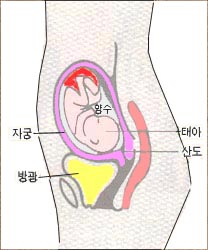
Copyright ⓒ 2014 John Sangwon Lee, MD., FAAP
Frequent urination and stress incontinence 소변이 자주 누는 증상과 스트레스 인콘티넨스

Bladder irritation caused by the pregnant uterus can cause frequent itching of urine During the first three months of pregnancy, pregnant women want to urinate more often than usual, and they actually do it more often.
These symptoms of pregnancy are called frequent urination’. Urinary tract infections or other diseases are absent in the urinary system, but due to pregnancy, urine is often collected.
Symptoms begin to occur 2-3 weeks after the correction.
Without diseases such as cystitis, it is common to urinate due to pregnancy, and when urinating frequently, the vulva or urethra does not hurt, and there are no other abnormalities in the body.
This type of urinary frequency in early pregnancy disappears spontaneously as the pregnancy progresses more and more, and can be added especially in the last months of pregnancy as it approaches the birth month.
At this time, the fetus normally descends from the upper part of the abdominal cavity of the pregnant woman into the lower part of the abdominal cavity.
So, the uterus containing the fetus can press the bladder of the pregnant woman and urinate frequently. The hormone progesterone stimulates the bladder, which can cause itching to urinate even when there is no urine in the bladder.
The kidneys work more during pregnancy, so they can urinate more.
When you laugh during pregnancy, when you cough, when you laugh or when you sneeze, you may see a small amount of urine when you suddenly move your body.
This symptom is called stress incontinence. You shouldn’t limit your fluid intake just because you urinate frequently due to pregnancy.
If you have to urinate frequently while sleeping and need to go to the bathroom often, it’s a good idea to limit your fluid intake a few hours before going to bed.
Cystitis, urethritis, or other types of abnormalities in the urinary tract can also cause frequent urination. If you want to urinate frequently, and if you suspect cystitis or another type of urinary tract infection, you should seek medical advice and treatment.
During pregnancy, Kegler’s exercise strengthens the pelvic floor muscles and strengthens the urethral sphincter function.
If you suspect a urinary tract infection, you should seek medical attention from your doctor. Sometimes it can be mistaken for urine to flow out when amniotic fluid flows through the vaginal cavity.
In this case, you should contact your doctor right away. Copyright ⓒ 2014 John Sangwon Lee, MD., FAAP
“부모도 반의사가 되어야 한다”-본 사이트의 내용은 여러분들의 의사로부터 얻은 정보와 진료를 대신할 수 없습니다.
“The information contained in this publication should not be used as a substitute for the medical care and advice of your doctor. There may be variations in treatment that your doctor may recommend based on individual facts and circumstances.
“Parental education is the best medicine.“